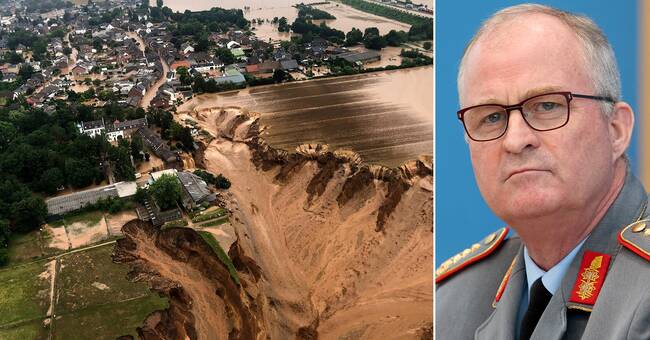The water masses still drown large parts of the affected area, but in some places the water sinks away.
In severely affected Erftstadt-Blessem, certain evacuations have been able to be lifted and the rescue service now considers the emergency operation to be completed.
But since many are still missing, it cannot be ruled out that more have died.
The German city of Wassenberg, in the district of Heisenberg, was forced to evacuate yesterday due to a dam on the river Ruhr.
A total of 700 people were forced to leave their homes and were further warned about evacuation during the night until Saturday.
The city is now partly under water, says a spokesman for the rescue service according to Süddeustche Zeitung.
Money on the way
At the same time as the scale of the disaster is becoming increasingly clear, the German government is preparing a comprehensive crisis package with support for the affected regions.
Minister of Finance Olaf Scholz tells ZDF that there is no lack of will or money to quickly reach out with the support.
- We will do everything so that those who need help get it.
Historically extensive natural disaster
The damage to infrastructure and homes is large and may be the most extensive caused by a natural disaster in Germany in 20 years, reports FAZ.
In 2002, insurance money corresponding to SEK 46 billion was paid out after the river Oder flooded and this time the destruction may be even greater.
"Protection against climate change neglected"
There is also an incipient debate on how shortcomings in climate policy have contributed to the disaster.
German Federal President Frank Walter-Steinmeier spoke yesterday about the need to act decisively on the climate issue, and for Malu Dreyer, Prime Minister of Rhineland-Palatinate, it is clear that protection against climate change has been neglected.
- There is a lot that has been necessary to do but has not been done.
I am convinced of that, she says according to FAZ.
Mourning day announced in Belgium
In Belgium, the water is receding in some places, but several flood warnings remain, not least on the river Maas, which flows through hard-hit Liège.
So far, 27 people have been confirmed dead, according to RTBF, and a national day of mourning has been announced for July 20.
The country's prime minister says the floods could be the worst to hit the country.
In the Netherlands, too, several places have been forced to evacuate.
In Venlo, 10,000 people were forced to leave their homes on Friday and further evacuations began on Saturday.

